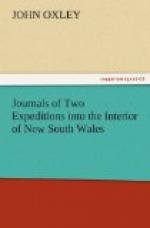It may perhaps be not superfluous to mention, that it is the intention of His Majesty’s Government to follow the course of the Macquarie River, and it is sanguinely expected that the result of the contemplated expedition will be such as to leave no longer in doubt the true character of the country comprising the interior of this vast island. It would be as presumptuous as useless to speculate on the probable termination of the Macquarie River, when a few months will (it is to be hoped) decide the long disputed point, whether Australia, with a surface nearly as extensive as Europe, is, from its geological formation, destitute of rivers, either terminating in interior seas, or having their estuaries on the coast.
J. O.
Sydney, New South Wales,
Dec. 11, 1817.
Errata: 12 items of errata, listed in the book at this point, have been corrected in this eBook.
JOURNAL OF AN EXPEDITION IN AUSTRALIA—Part I
On the twenty-fourth of March I received the instructions of his excellency the Governor to take charge of the expedition which had been fitted out for the purpose of ascertaining the course of the Lachlan River, and generally to prosecute the examination of the western interior of New South Wales.
On the sixth of April I quitted Sydney, and after a pleasant journey arrived at Bathurst on the fourteenth, and found that our provisions and other necessary stores were in readiness at the depot on the Lachlan River. We were detained at Bathurst by rainy unfavourable weather until the nineteenth, when the morning proving fine, the Bat horses, with the remainder of the provisions, baggage, and instruments, were sent off, we intending to follow them the ensuing morning.
Bathurst had assumed a very different appearance since I first visited it in the suite of his excellency the Governor in 1815. The industrious hand of man had been busy in improving the beautiful works of nature; a good substantial house for the superintendant had been erected, the government grounds fenced in, and the stack yards showed that the abundant produce of the last harvest had amply repaid the labour bestowed on its culture. The fine healthy appearance of the flocks and herds was a convincing proof how admirably adapted these extensive downs and thinly wooded hills are for grazing, more particularly of sheep. The mind dwelt with pleasure on the idea that at no very distant period these secluded plains would be covered with flocks bearing the richest fleeces, and contribute in no small degree to the prosperity of the eastern settlements.




